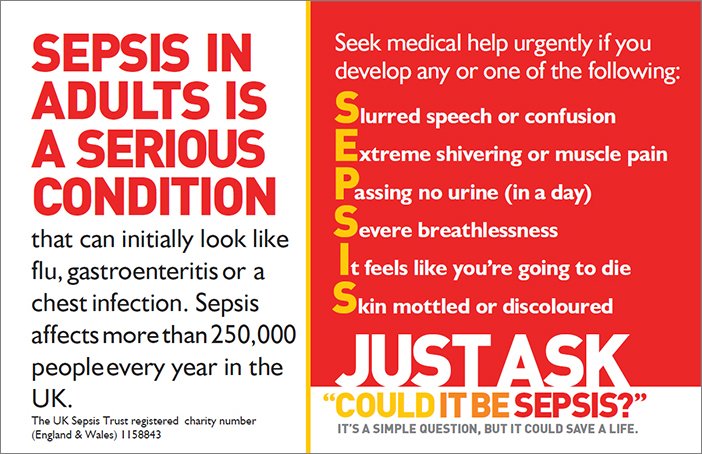
World Sepsis Day, observed on the 13th of September, united individuals and healthcare professionals worldwide in the fight against Sepsis, which accounts for at least 11 million deaths globally every year. Various healthcare institutions, including the NHS and organisations like the Sepsis Trust, actively participated in spreading awareness about Sepsis, its early signs, and the importance of timely medical intervention.
Facts about Sepsis from the World Sepsis Day Website
CASES & DEATHS
- 47 to 50 million sepsis cases per year
- At least 11 million deaths per year
- 1 in 5 deaths worldwide is associated with Sepsis
- 40% of cases are children under 5
SEPSIS IS THE NUMBER ONE…
- …cause of death in hospitals
- …of hospital readmissions
- …healthcare cost
SOURCES OF SEPSIS
- Sepsis is always caused by an infection – like pneumonia or diarrheal illness
- 80% of sepsis cases occur outside of a hospital
- Up to 50% of sepsis survivors suffer from long-term physical and/or psychological effects
Understanding Sepsis
Sepsis occurs when the body’s response to an infection results in damage to its own organs. If left untreated, Sepsis can lead to septic shock, a critical and often fatal condition.
Recognising the Symptoms: The symptoms of Sepsis can be remembered with the acronym ‘SEPSIS’:
- S: Slurred speech or confusion
- E: Extreme shivering or muscle pain
- P: Passing no urine (in a day)
- S: Severe breathlessness
- I: It feels like you’re going to die
- S: Skin mottled or discoloured
If you or someone else is experiencing any of these symptoms, seeking medical attention is crucial.
Early Intervention is Key
Early recognition and treatment of Sepsis can significantly improve the chances of recovery. If you suspect Sepsis, it’s crucial to get to the nearest NHS hospital or contact your GP immediately. The NHS is equipped to provide rapid assessment and treatment for Sepsis, which may include antibiotics and other supportive measures.
Preventing Infections
Preventing infections can reduce the risk of developing Sepsis. Ensure to:
- Keep vaccinations up to date
- Practice good hygiene, like handwashing
- Seek prompt medical attention for infections
Sepsis is a medical emergency that requires immediate attention. Understanding the signs and seeking prompt medical care can significantly improve outcomes. The NHS provides comprehensive care for sepsis patients, and it’s crucial to utilise these resources if you suspect you or a loved one may be suffering from Sepsis. Through awareness and education, especially on platforms like World Sepsis Day, we can work together to reduce the impact of Sepsis and save lives.
For more information on Sepsis, you can visit:
- This page provides a detailed overview of the symptoms of Sepsis and its life-threatening nature.
- Information about who is more likely to get Sepsis and how to avoid infections.
Signs of Sepsis and What to Do (PDF) – NHS England
- An easy-read document detailing the symptoms of Sepsis and the steps to take if you suspect Sepsis.
Treatment and Recovery from Sepsis – NHS
- NHS information about treatments and recovery from Sepsis, post-sepsis syndrome, and where to get support.
Our Work on Sepsis – NHS England
- Information on the clinical policy and work being done on Sepsis by NHS England.
Easy-Read Information: Sepsis – NHS England
- Easy-read documents providing information about how to avoid Sepsis, spotting the signs of Sepsis, and problems after Sepsis.
Share this post
Latest News posts
Avoiding Respiratory Infections
November 29, 2018
Marijuana use and aspergillosis
November 23, 2018
Gardening
November 22, 2018
Dehumidifiers
November 16, 2018
Anti-allergen products
November 16, 2018
Patients and Carers meeting May 2013
January 10, 2019
Film: Faces From The ICU
December 13, 2018
Tribute to Steph Smith – October 2010
December 6, 2018
Avoiding Respiratory Infections
November 29, 2018
Marijuana use and aspergillosis
November 23, 2018
Gardening
November 22, 2018
Dehumidifiers
November 16, 2018
Anti-allergen products
November 16, 2018
Patients and Carers meeting May 2013
January 10, 2019
Film: Faces From The ICU
December 13, 2018
Tribute to Steph Smith – October 2010
December 6, 2018
News archive
- Antifungals in development
- COVID-19
- Events
- Fundraising
- General interest
- How do I...?
- Information and Learning
- Latest research news
- Lifestyle and Coping Skills
- Living with Aspergillosis
- NAC announcements
- News archive
- Patient and Carer Blog
- Patient stories
- Recordings
- Supplements and complementary therapies
- Types of aspergillosis
- Video
